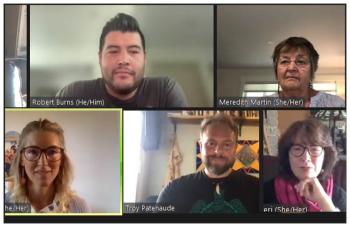Image Caption
Summary
Local Journalism Initiative Reporter
Windspeaker.com
Indigenous people have a connection with the land that has a deep pull.
“Indigenous peoples’ relationship with the land has a kinship. We’re kin with the land,” said Jessie Fiddler-Kiss, who facilitated a panel discussion on Sept. 13 with the theme Truth and Decolonization.
“It’s like an unconditional caregiver to us…We don’t see (the land) as something to consume or extract or live upon. We’re part of it,” said Fiddler-Kiss, who is Métis with roots in Batoche, Sask.
The panel was hosted by Outward Bound and its Training Academy for Outdoor Professionals. It was part of an effort to diversify the outdoor sector by providing insight into the experiences and teachings of Indigenous peoples.
Outward Bound Canda is a charitable organization that focuses on developing resilience, leadership and compassion in youth through their participation in outdoor activities that connect them to the natural world.
The majority of the panellists who spoke at the Outward Bound event did not live in their own homelands and that seemed to create a sense of longing for home and a gratitude for living in the homelands of others.
Kathi Camilleri, who is a facilitator and consultant, leading strategic sessions on Canada’s assimilation and colonization policies, called herself an “uninvited guest” residing in a territory in which she was not born. Of Métis and Cree ancestry, she was born in Treaty 4 territory in Saskatchewan. Her family settled in Campbell River in British Columbia.
“I want to be a good guest wherever I go,” she said. “I don’t want to help myself to things that aren’t mine. I want to walk humbly, with a willingness to be taught and corrected.
“Our cultures are all connected to the land,” Camilleri explained. “Wherever Creator has placed our people, we use the resources of that land and it becomes part of our cultural identity and we know we’re home.”
Troy Patenaude, a land-based educator, has also spent most of his years in a territory where he was not born. His connection is to the Georgian Bay Métis Community around the Great Lakes in Ontario. He said he grew up not knowing his own Métis history.
He has lived most of his life in the Blackfoot and Ktunaxa territories throughout the Rocky Mountains.
“It’s a complex, but really kind of a beautiful balancing act that I feel that I’m always going through as my relationship to the land develops,” said Patenaude.
He said he returns to Georgian Bay to ensure he’s not “too much of a stranger to that area.” He’s lived most of his life in the Rocky Mountains, which straddle the Alberta and British Columbia border. Patenaude said he goes to Blackfoot Elders and knowledge keepers, attends ceremonies and learns their stories.
“In most cases, it’s not always my place to regurgitate and tell these stories, but it changes the way I might talk about things and understand things, (and) move through the land with people as a guide or an Outward Bound instructor,” he said.
Robert Burns is a co-ordinator for youth programs at Ki-Low-Na Friendship Centre in Kelowna. He is from the Gitxsan and Heiltsuk First Nations. He grew up outside his community in urban settings.
“Land is home when I want to go home, but I can’t… It comes back to how I relate in place because land is this universal communication among all of us. It’s something that we share. It’s something we look to understand in different ways,” he said.
When he introduces youth to the land, said Burns, he helps them to understand what a great teacher, healer and provider land can be.
Land-based learning, he said, is “not about achievement. It’s not about getting to that peak or understanding that body of water or the sense of conquering and conquest. It is the sense of connection…and that’s how I walk with the land.”
That’s a sentiment shared by Meredith Martin, who is of Coast Salish ancestry with the Snuneymuxw First Nation. She has worked with child and youth mental health and is retired now.
Throughout a chaotic childhood, she said, she found solace in the land, which served as her best friend and her healer.
“I honoured (the land) and it honoured me. It was a real relationship,” she said. “When I walk now, I try to remember how deep that relationship was…I really want to walk in a way that I honour this relative, because I’m not dominant.”
Speaking after the panel discussion, Andrew Young, executive director of Outward Bound Canada, said he was “really struck” by the contrast in Indigenous and colonial perspectives when it comes to thinking about land.
“The colonial approach of nature (is) being something that is to be conquered, used as something to extract resources from. And then the Indigenous perspective, it’s more about being one with the land and one with nature. The term of being in relations, I think, is really a powerful piece and a real strong contrast,” said Young.
Local Journalism Initiative Reporters are supported by a financial contribution made by the Government of Canada.

